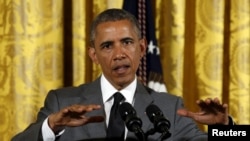President Barack Obama has an offer for Democrats who fear political attacks if they back his trade agenda: Give me your vote now, and I'll have your back come re-election next year.
Days from a critical House vote, it's still far from certain Obama can muster enough votes. Although Republican leaders in Congress strongly support the budding trade deals, Obama has little leverage with individual GOP lawmakers. So the president has been dangling a carrot in front of Democrats in the form of a promise to campaign for them in 2016 if they face primary challenges or attacks by unions that have vehemently opposed his trade agenda.
White House officials have sought to differentiate Obama's offer of support from the more heavy-handed tactics they say the unions are deploying to scare Democrats. On Monday, the AFL-CIO said it was ramping up its television ad campaign attacking Democrats who have backed the trade bill - and warning those on the fence not to make the same choice.
“I'm not going to hypothesize about not getting it done,” Obama, attending a Group of Seven meeting in Germany, said Monday when asked whether he had enough votes. “I intend to get it done.”
Yet Obama's transactional offer - campaign help in exchange for a “yes” vote - begs a broader question: Will Democrats even want Obama campaigning for them in 2016?
Last year, most Democrats in competitive districts wanted the president to stay away, concerned that his sagging popularity made him more of a political liability than an asset among independent and Republican-leaning voters. In San Diego, where unions are lobbying Democratic Rep. Scott Peters to vote against trade, Gretchen Newsom of the International Brotherhood of Electrical Workers said the unions' powerful get-out-the-vote operation will be much more valuable next year than a “celebrity endorsement” from Obama.
But Obama administration officials said Democratic lawmakers have told the White House they want the president out front, making the case in their districts and on national television to help provide political cover. Dan Pfeiffer, until recently Obama's long-serving senior adviser, said Obama's enduring popularity with die-hard Democrats would make him a huge asset in next year's primaries.
“He offers fundraising and organizational muscle like no one else other than the Democratic nominee, who will be otherwise occupied,” Pfeiffer said.
To be sure, Obama will likely remain a fundraising powerhouse for Democrats even as the party's enthusiasm shifts to Hillary Rodham Clinton and her competitors for the 2016 Democratic nomination. And in a few districts, particularly those occupied by members of the Congressional Black Caucus, Obama's endorsement could go a long way toward inoculating Democrats who come under fire from unions and liberals if they vote for trade.
Such a scenario could put the president and the unions - traditionally close Obama allies - on opposing sides of Democratic primary fights heading into the final months of Obama's presidency.
“We're trying to not make this about the president,” Bill Samuel, the AFL-CIO's chief lobbyist, said in an interview. Still, he warned, “It's going to be hard for us to convince working families to vote for members of Congress who voted to jeopardize their jobs and their incomes, even if we wanted to.”
Obama is seeking legislation that would allow Congress to approve or reject - but not modify - a pair of trade deals he's negotiating with countries in Europe and the Asia-Pacific region. Obama, who returned late Monday from a meeting with European leaders focused partly on trade, argues the legislation is imperative to negotiating the best possible deal because foreign leaders want assurance that Congress won't scuttle the deal at the last minute.
The Senate narrowly passed the bill, but it still appears to be more than a dozen votes short in the House, where leaders are hoping for a vote later this week. Fewer than 20 Democrats have said they'll support the bill, and although a handful are still on the fence, House Democratic leader Nancy Pelosi has warned not to expect any additional Democratic votes.
Yet some Democrats are clearly still wrestling with their vote.
Freshman Rep. Kathleen Rice, D-N.Y., had publicly opposed the trade bill, but in an about-face over the weekend, she said she'd finally been persuaded by the president's case. She said too often, Washington politics muddies arguments about what's really best for the middle class.
“Even if I bear the political cost of it, I'd rather battle than abet that unfortunate reality,” Rice said in an op-ed in the congressional newspaper The Hill.
The AFL-CIO swiftly announced plans to hold a rally outside Rice's office, calling her reversal a “slap in the face.”
Lawmakers like Rice, who represents a relatively moderate district on Long Island, are unlikely to lose re-election to more liberal Democratic challengers despite a “yes” vote on trade.
“In recent years, it's been more common for Republicans to have primary trouble,” said Kyle Kondik, who analyzes House races for the University of Virginia's Center for Politics.
But in some parts of the country, where many blue-collar workers blame decades-old NAFTA for heavy job losses, the notion of running for re-election over the opposition of unions is unsettling. That's especially the case in California, which holds nonpartisan primaries in which the top two vote-getters proceed to the general election - even if both are Democrats.




